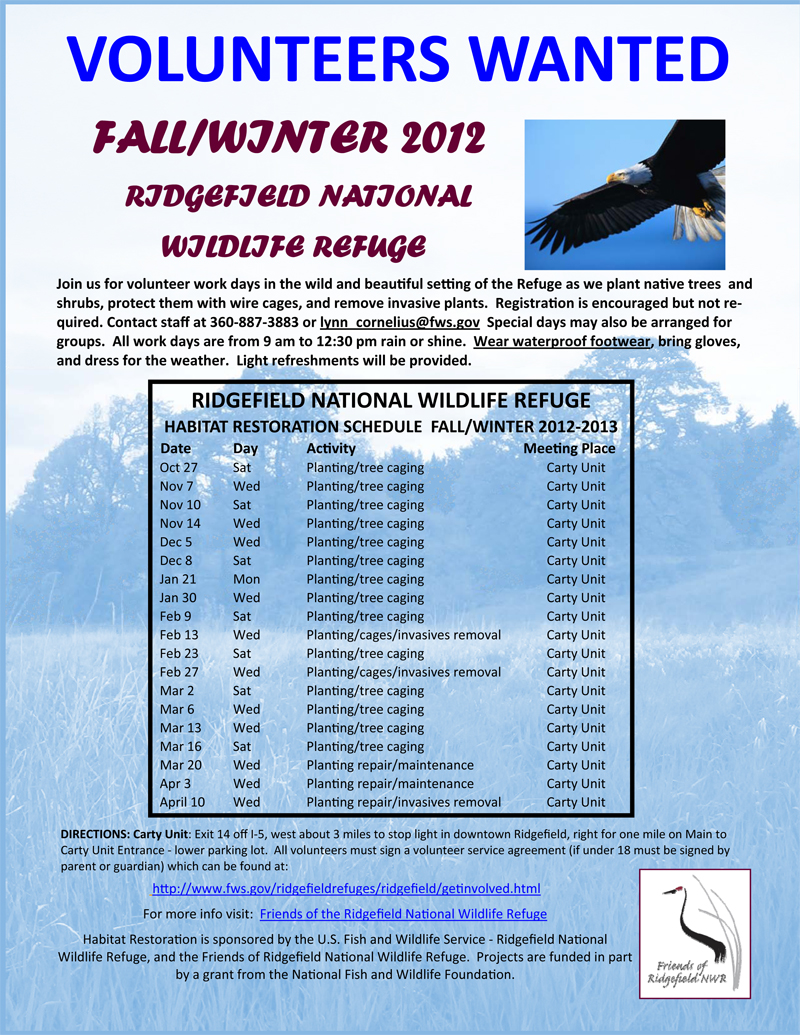|
Volunteer Position Descriptions
To view current volunteer opportunities please view the Volunteer Calendar
Click the below image to download a full-size PDF of our Volunteer Flier.

Contact Lynn Cornelius at lynn_cornelius@fws.gov or (360) 887-3883.
Restoration projects funded in part by grants from the National Fish and Wildlife Foundation
Cultural Education/Cathlapotle Plankhouse (April through October)
o Plankhouse Docent: Staff the Plankhouse for 4-hour shifts on weekends, noon to 4:00pm, or with pre-scheduled groups. There are many displays, activities, special programs and presentations during the weekends, including Artist-In-Residence (AIR), Second Sundays, and workshops all spring and summer. An in-depth training will be provided. Typical commitment is one shift per month.
o School Groups: Lead or assist in 35-45 min presentations on Chinookan culture, the use and meaning of the Plankhouse and its artwork, and the daily lives of the Native Americans who occupied this area for thousands of years. There are many replica artifacts and examples to talk about and hand to the students as well as simple activities to illustrate food gathering and preparation, basketry, and other crafts. These field trips also include the Artist-In-Residence Series and require more volunteers during these events. Field trips normally occur between 9am and 1pm during weekdays and are the most numerous April to mid-June and September to early October. The above mentioned in-depth training is also provided. No long term commitment needed for those
assisting.
o Special Projects: Plankhouse volunteers do many miscellaneous jobs like creating activities and supplies for school groups, gathering plant materials and creating traditional items for display, maintenance to the Plankhouse, and help with special event planning and set-up. If you have a special skill or are just interested in working 'behind the scenes' you may want to be involved with these projects. Needs are intermittent.
Environmental Education (April through October)
o Naturalist Volunteers – School Group Hikes and Weekend Visitors: Volunteers will take school groups out on the Oaks to Wetlands Trail for a 35 to 45 minute low-impact hike and lead students in activities that teach about biological processes and conservation. Staff will work with volunteers to hone their naturalist skills. Hand-outs and clear activities sheets for the students will also be provided. No long term commitment needed for those assisting.
Refuge Guide (All year)
o Refuge Guide at the River S Unit – Staff the contact station on the River S Unit/Auto Tour Route to greet visitors, tell them about the refuge, current wildlife sightings, and answer other refuge questions. Those volunteers that are not comfortable sitting in one place too long supplement this activity by driving the 4.2 mile loop answering questions and showing visitors where the latest bird sightings are or walking the Kiwa trail doing the same. Track contacts while you go around and make notes for things that need to be brought to staff attention. Training and reference materials supplied. Typical commitment ranges from once per month to once per week.
Habitat Restoration (All year)
o Invasive plant removal – Want to help manage invasive plants? Join us as we access remote parts of the Refuge to dig, pull, or cut, invasive plants. We remove English ivy, yellow flag iris, ricefield bulrush, and other invasives. Shovels and other tools will be provided. This is a great opportunity to see parts of the Refuge that are not accessible to the general public. No experience necessary, just enthusiasm to enhance the environment!
o Tree planting – Join us to plant native trees and shrubs at the Refuge. Our planting efforts will help improve stream health, create wildlife habitat, and restore native plant communities.
o Tree plantation maintenance – Be a part of this vital, and often overlooked, step in habitat restoration. We will monitor and maintain our previous plantings by repairing/retrofitting tree tubes, fixing beaver fences, and otherwise taking care of our plantings.
o Other projects – Interested in other habitat work? We have a variety of other projects and programs going on year-round that are not posted on the volunteer calendar. Other volunteer work may occur on an as-needed basis, so let us know your availability and special skills of experience.
For more information about volunteering please contact the Refuge Volunteer Coordinator Josie Finley at josie_finley@fws.gov or 360-887-4106.
|